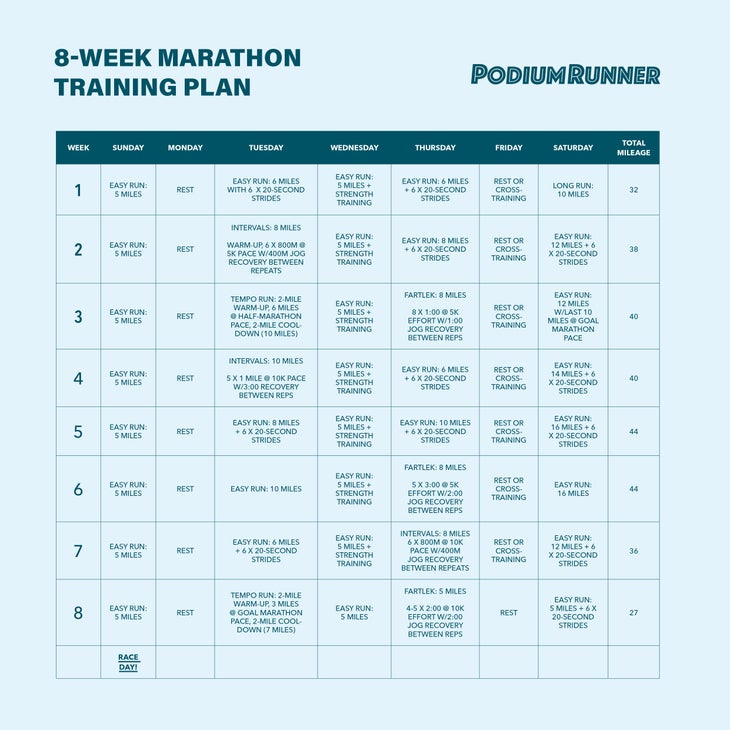Can You Prepare for a Marathon in 2 Months
Yes, you can prepare for a marathon in 2 months with a structured training plan. By following a proper schedule of running, cross-training, and rest, you can build your endurance and reach the finish line successfully.
Marathons require thorough preparation, but with dedication and consistency, it’s possible to train in a shorter time frame. It’s crucial to gradually increase your mileage, focus on strength training, and prioritize recovery to prevent injuries. Remember to listen to your body, stay hydrated, and fuel properly during training.
With a positive mindset and the right approach, you can conquer the challenge of a marathon within 2 months.
The Basics Of Marathon Training In 2 Months
Welcome to our blog post on the basics of marathon training in just 2 months! If you’ve signed up for a marathon with a tight timeline, don’t worry – it’s still possible to prepare yourself both mentally and physically for the challenge ahead. In this post, we’ll cover the three essential steps you need to take to ensure a successful and rewarding marathon experience.
Assessing Your Current Fitness Level:
Before beginning any marathon training program, it’s crucial to assess your current fitness level. This step allows you to understand your starting point and tailor your training plan accordingly. Keep in mind that honesty with yourself is key here; accurately evaluating your fitness level will help prevent injury and provide realistic expectations.
Here’s how you can assess your current fitness level:
- Perform a timed run: Start by timing yourself while completing a run at a comfortable pace. Note the distance covered and the time taken. This will be your baseline for improvement.
- Strength and flexibility: Take note of your strength and flexibility levels. Identifying any areas of weakness will help you incorporate targeted exercises into your training plan.
- Health check-up: Schedule a visit to your healthcare provider to ensure you are in good health to undergo intense training. It’s essential to prioritize your safety and well-being throughout the process.
By assessing your current fitness level, you’ll gain valuable insights into where you stand physically, setting the stage for effective marathon training in the following months.
Setting Realistic Goals:
Setting realistic goals is a vital step in preparing for a marathon in just 2 months. While it may be tempting to push yourself to the limit, it’s important to avoid overexertion and potential injury. Here are some tips for setting achievable goals:
- Pace yourself: Determine a realistic pace for your marathon based on your fitness level and available time for training. Strive for steady progress rather than attempting to achieve a personal best.
- Gradual mileage increase: Increase your weekly mileage gradually to avoid excessive strain on your body. Aim for a weekly increase of 10% or less to minimize the risk of injury.
- Listen to your body: Pay attention to any signs of fatigue, pain, or burnout during training. Adjust your goals accordingly and give your body the rest it needs to recover.
Remember, setting realistic goals doesn’t mean settling for mediocrity. It’s about finding a balance that allows you to challenge yourself while remaining within your physical capabilities.
:max_bytes(150000):strip_icc()/be-marathon-ready-in-3-months-4142968-Final-f5f1453e4e0048cbbdaff920381fdc1f.png)
Credit: www.verywellfit.com
Creating A Training Plan
Prepare for a marathon in 2 months with a focused training plan. Incorporate a mix of long runs, speed work, and strength training to build endurance and prevent injury. Proper nutrition, hydration, and rest are equally crucial for a successful race.
Establishing A Consistent Schedule
To succeed in marathon training, set a weekly running schedule. Include long runs, short runs, and rest days.Balancing Running With Cross-training
Incorporate cross-training like cycling and swimming to avoid overuse injuries. Find a balance between running and cross-training. Creating a marathon training schedule requires consistency. Include a variety of running types to prevent overuse injuries.Nutrition And Hydration
Eating correctly and staying hydrated are vital aspects of marathon training.
Fueling Your Body For Training
Consume a balanced diet with carbohydrates, proteins, and healthy fats to fuel your runs.
- Carbohydrates: Provide energy for training and race day.
- Proteins: Aid in muscle recovery and maintenance.
- Healthy fats: Help in absorbing nutrients and providing sustained energy.
Hydration Strategies
Stay hydrated before, during, and after your runs for optimal performance.
- Drink water: Regularly hydrate throughout the day.
- Electrolytes: Consider sports drinks for replenishing electrolytes lost through sweat.
- Timing: Hydrate before you feel thirsty to maintain proper hydration levels.
Injury Prevention And Recovery
When it comes to preparing for a marathon in just 2 months, injury prevention and recovery become crucial aspects of your training plan. Pushing your body to its limits in a short amount of time requires careful attention to how it responds to the increased demands. By listening to your body, incorporating rest days, and following proper recovery techniques, you can decrease the risk of injury and increase your chances of successfully completing the marathon.
Listening To Your Body
Listening to your body is key when training for a marathon in a short timeframe. Your body will provide you with important signals and cues about how it’s feeling and if it needs rest or recovery. Ignoring these signals can lead to overuse injuries, fatigue, and even burnout.
- Pay attention to any pain or discomfort, especially in your joints, muscles, or tendons. Prolonged or worsening pain should not be ignored and may require professional evaluation.
- Be aware of any persistent fatigue or feelings of exhaustion. Pushing through extreme fatigue can increase the risk of injury and hinder your progress.
- Monitor your sleep quality and energy levels. Lack of sleep and constant fatigue can compromise your immune system and make you more prone to injuries.
- Track your running pace and performance. Any sudden decline in performance or inability to maintain your usual pace could be a sign of overtraining.
Incorporating Rest Days
Rest days may seem counterintuitive when you have a limited time for training, but they are vital for injury prevention and recovery. Your body needs time to repair and rebuild after intense workouts, which in turn improves your overall performance.
Incorporate rest days into your training schedule and give your body time to replenish its energy stores and recover from the physical stress of running. Use these rest days to engage in low-impact activities such as stretching, yoga, or light cross-training. This active recovery will promote blood flow to your muscles, help reduce muscle soreness, and enhance flexibility.
Proper Recovery Techniques
Recovery techniques play a critical role in preventing injuries and maximizing your training progress. Here are some key recovery practices to incorporate into your routine:
- Stretching: Dedicate time to properly stretch before and after each run. Focus on dynamic stretches before running to warm up your muscles and static stretches after running to improve flexibility and prevent muscle tightness.
- Massage or Foam Rolling: Use a foam roller or schedule regular massages to release muscle tension and improve circulation. This can help reduce soreness and aid in muscle recovery.
- Hydration and Nutrition: Proper hydration and nutrition are essential for recovery. Drink enough water throughout the day and refuel your body with nutrient-rich meals and snacks.
- Sleep: Aim for quality sleep every night. Sleep is when your body repairs and recharges, so prioritize getting enough restful sleep each night.
- Ice and Cold Water Immersion: Ice baths or cold water immersion can help reduce inflammation and speed up the recovery process. Consider incorporating these techniques after particularly intense workouts.
By listening to your body, incorporating rest days, and following proper recovery techniques, you can greatly reduce the risk of injury and increase your chances of preparing for and completing a marathon in just 2 months. Remember, your body is your greatest training tool, so take care of it along the way.
Mental Preparation And Motivation
When it comes to preparing for a marathon in just 2 months, mental preparation and motivation play a crucial role in ensuring success. While the physical training is important, being in the right mindset is equally vital. Here’s how you can mentally prepare and stay motivated for the challenge ahead.
Staying Focused And Positive
Staying focused on your goal is essential during the intense 2-month preparation period. Create a positive mindset by visualizing yourself crossing the marathon finish line. Break down your training into smaller, achievable goals, and celebrate each milestone to maintain a positive outlook. Remind yourself of your commitment and the excitement of completing the marathon.
Drawing Inspiration From Others
Drawing inspiration from other runners can help you stay motivated and focused. Surround yourself with supportive and like-minded individuals, whether it’s joining a running group or following inspirational stories of other marathoners. Witnessing the dedication and achievements of fellow runners can provide the extra push you need to stay on track and committed to your training.

Credit: jessbarron.medium.com

Credit: marathonhandbook.com
Frequently Asked Questions Of Can You Prepare For A Marathon In 2 Months
Can I Be Marathon Ready In 2 Months?
Yes, it is possible to be marathon ready in 2 months if you follow a proper training plan and have a decent level of fitness. However, it is important to consult with a professional coach and gradually increase your mileage to avoid injuries.
Can You Get Marathon Fit In 8 Weeks?
Yes, it’s possible to improve marathon fitness in 8 weeks with consistent training and dedication.
How Long Does It Take To Prepare For A Marathon?
It generally takes around 16 to 20 weeks to properly prepare for a marathon. Regular training, building up mileage, and incorporating rest are key components.
Conclusion
Preparing for a marathon in just 2 months requires dedication and proper planning. By following a structured training program that includes a mix of runs, strength training, and rest days, you can improve your endurance and increase your chances of successfully completing the race.
Remember to listen to your body and make adjustments as necessary, and don’t forget to stay consistent with your nutrition and hydration. With determination and perseverance, you can achieve your marathon goals in a short timeframe. Keep pushing yourself and enjoy the journey!






